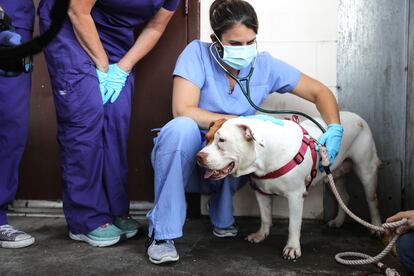Mysterious dog illness in the U.S: What you need to know
Experts may have identified a pathogen that has sickened and killed dogs around the country

A “mysterious” respiratory illness has been spreading across the United States, affecting hundreds of dogs and leaving veterinarians grappling with a challenging situation. However, researchers at the University of New Hampshire’s Veterinary Diagnosis Laboratory and the Hubbard Center for Genome Studies have made significant strides in identifying a potential culprit behind the disease.
According to NBC News, researchers have uncovered a previously unknown germ through genetic sequencing of samples from infected dogs in New Hampshire, Rhode Island, and Massachusetts. Dr. David Needle, the pathology section chief at the University of New Hampshire, described the pathogen to USA Today as a “funky bacterium” that is smaller than typical bacteria in size and genome. The germ is believed to have evolved from a component of the dog microbiome, although it’s not yet confirmed if this is the same pathogen causing illness in dogs nationwide.
What is the illness?
The American Veterinary Medical Association (AVMA) is monitoring reports of a canine respiratory illness across the country, with over 200 cases reported in Oregon alone since mid-August. The illness is resistant to antibiotics and has been observed in various states, leading to numerous fatalities. Researchers at the University of New Hampshire’s Veterinary Diagnosis Laboratory and the Hubbard Center for Genome Studies have identified a potentially causative pathogen through genetic sequencing.
The illness appears to be a chronic respiratory disease that, in some cases, can lead to pneumonia. While antibiotics have shown limited efficacy, the newly identified bacterium’s structure provides insights into potential treatment options. The antibiotic doxycycline has been suggested as a possible effective treatment.
The lack of a specific test and the similarity of symptoms to other respiratory infections present challenges to experts. Despite efforts to grow the new bacteria in the lab for testing, researchers have been unsuccessful.
What are the symptoms for the dog illness?
Dogs with the illness can present symptoms such as coughing, sneezing, nasal or eye discharge, difficulty breathing, and fatigue. The illness has been observed to manifest in three general clinical syndromes: chronic mild-moderate tracheobronchitis, chronic pneumonia, and acute pneumonia with rapid progression, often leading to negative outcomes within a short timeframe.
It is recommended that dog owners seek veterinary care promptly if these symptoms are observed.
How does it spread?
Experts say that it’s most likely spread through close contact and breathing the same air of an infected animal.
Which states have reported cases of the dog illness?
Cases of the respiratory illness have been reported in several states, including Oregon, Colorado, New Hampshire, Rhode Island, Massachusetts, California, Indiana, Illinois, Washington, Idaho, Georgia, and Florida. While the research team has not confirmed if the same pathogen is causing illness nationwide, the situation is a cause for concern, and veterinarians are actively collaborating to understand and combat the disease.
What can I do to protect my dog?
Veterinarians advise dog owners to take precautions during the ongoing holiday season. These include reducing contact with large groups of unknown dogs, avoiding sick dogs, keeping sick dogs at home, and seeking veterinary care promptly if they present any symptoms. They also recommend that dogs are up-to-date on necessary vaccinations, including canine influenza, Bordetella, and parainfluenza, as well as avoiding communal water bowls.
Can the illness kill my dog?
Although some dogs have died from the illness, Needle said that it is not particularly fatal. “I think a subset of animals can develop pneumonia, more or less like upper respiratory, bronchitis, rhinitis, tracheitis”. If that secondary infection appears, it can lead to death, he explained.
Sign up for our weekly newsletter to get more English-language news coverage from EL PAÍS USA Edition
Tu suscripción se está usando en otro dispositivo
¿Quieres añadir otro usuario a tu suscripción?
Si continúas leyendo en este dispositivo, no se podrá leer en el otro.
FlechaTu suscripción se está usando en otro dispositivo y solo puedes acceder a EL PAÍS desde un dispositivo a la vez.
Si quieres compartir tu cuenta, cambia tu suscripción a la modalidad Premium, así podrás añadir otro usuario. Cada uno accederá con su propia cuenta de email, lo que os permitirá personalizar vuestra experiencia en EL PAÍS.
¿Tienes una suscripción de empresa? Accede aquí para contratar más cuentas.
En el caso de no saber quién está usando tu cuenta, te recomendamos cambiar tu contraseña aquí.
Si decides continuar compartiendo tu cuenta, este mensaje se mostrará en tu dispositivo y en el de la otra persona que está usando tu cuenta de forma indefinida, afectando a tu experiencia de lectura. Puedes consultar aquí los términos y condiciones de la suscripción digital.









































